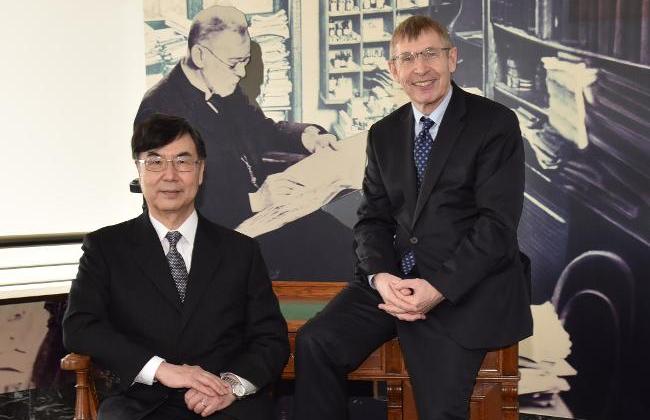Award winner of the Paul Ehrlich- and Ludwig Darmstaedter Prize 2020 presents his research
Professor Shimon Sakaguchi receives the Paul Ehrlich- and Ludwig Darmstaedter Prize 2020 – which is worth 120,000 Euro – for the discovery of regulatory T cells. Because of the function they fulfil, these cells are also called the “Blue Helmets of the Immune System”. They help our immune system to recognise what is foreign tissue and what is the body’s innate tissue, thus guiding the immune system to make the correct decision during immune reactions. The Japanese immunologist is visiting the Paul-Ehrlich-Institut (PEI) to discuss his findings, which represent a significant breakthrough, with researchers of the institute.
 From left to right: Prof. Dr Shimon Sakaguchi, Prof. Dr Klaus Cichutek
From left to right: Prof. Dr Shimon Sakaguchi, Prof. Dr Klaus Cichutek
Following the tradition, this year, too, the prize winner accepted this invitation to the Paul-Ehrlich-Institut (PEI) to present his award-winning research results to the public. Based on the current situation caused by SARS-CoV-2, the event is taking place without the general public.
Research requires perseverance – this was also required from Professor Sakaguchi. The researcher had been performing his research on immune cells at Osaka University for many years. He focused on regulatory T cells and their significance for immune tolerance at an early stage. While among most experts the view prevailed that tolerance toward the body’s innate cells was conveyed exclusively in the thymus gland, a gland of the lymphatic system, Sakaguchi recognised that that regulatory T cells also played a role here. These cells help the immune system to keep its equilibrium and make a decision between friends and enemies. Errors in this decision can lead to serious diseases, including cancer or immune disorders such as rheumatism or multiple sclerosis. In this context, regulatory T cells are suitable approaches for the development of therapies for the treatment of disorders of the immune system.
"Understanding the mechanisms which lead to incorrect decisions of the immune system are essential to find approaches to therapies for diseases in which either the body’s innate defense system is not active, such as the development of tumours, or is active in error, as is the case in autoimmune diseases"
, said Professor Klaus Cichutek, president of the PEI.
Professor Sakaguchi’s perseverance as researcher has finally proved its worth: The Paul-Ehrlich- und Ludwig-Darmstaedter Prize is considered as one of the most renowned awards in medicine. It is not unusual that the prize winner is awarded the Nobel Prize at a later stage.
top



